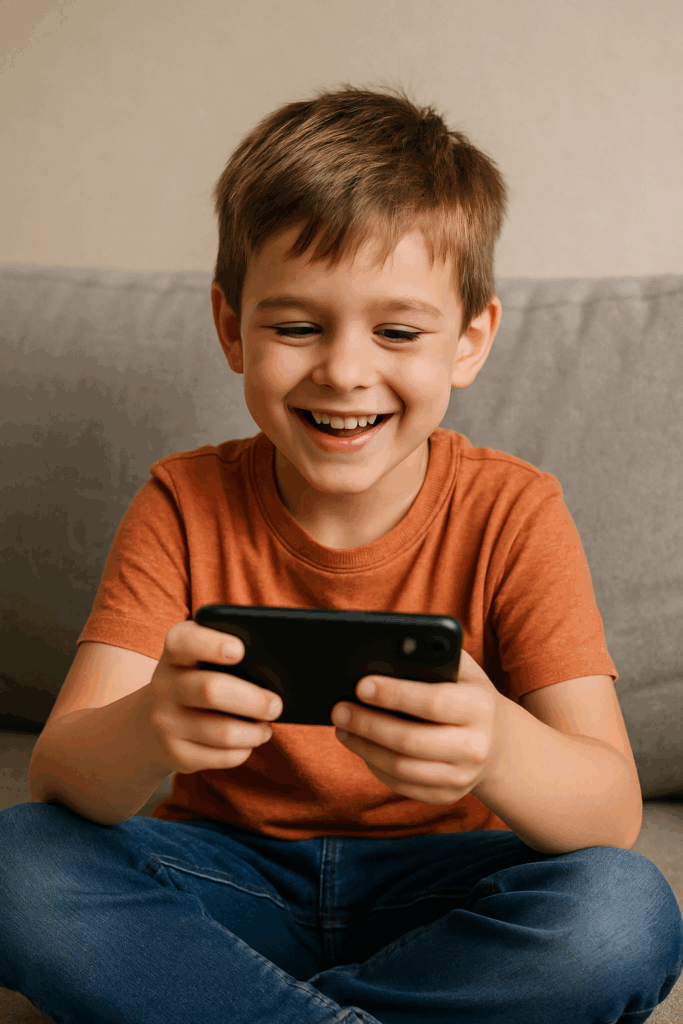
How pausing and redirecting can turn children’s screen habits into opportunities for growth
In my last article, I shared the story of how I came up with the idea for BlockLearn, an app designed to help parents feel good about every minute their children spend on devices. Today, I want to take that conversation further by exploring the research behind the problem, the far-reaching impacts of excessive screen time on children, and why we’ve made a crucial shift in our approach: from blocking to pausing and redirecting.
The Growing Concern Around Screen Time
Children today are spending more time on screens than ever before. Studies show that Australian children average more than 4.5 hours per day on devices outside of school a number that continues to climb. Globally, the figures are just as concerning, with some reports suggesting kids are spending the equivalent of an entire day per week glued to entertainment apps, games, or social media.
On the surface, this may feel like just another part of modern life. But research points to serious long-term consequences:
- Mental health challenges: High levels of recreational screen time have been linked to increased rates of anxiety, depression, and poor sleep quality.
- Learning impacts: Excessive scrolling can reduce attention spans, disrupt memory, and compete with time that could be spent on skill-building or education.
- Physical health risks: Sedentary habits contribute to rising levels of childhood obesity, vision strain, and posture issues.
- Social development: More time on screens often means less face-to-face interaction, reducing opportunities to build essential communication and teamwork skills.
When you look at the big picture, it’s clear this isn’t just about kids spending too much time online. It’s about their future wellbeing, learning outcomes, and even long-term economic impact as the next generation enters the workforce.
Why Blocking Isn’t the Answer
The first version of our idea focused on blocking entertainment apps to help kids manage screen time. While effective in theory, we quickly realised it could feel restrictive, almost like punishment. And for many children, the moment something is blocked, they either push harder against the barrier or look for workarounds.
We didn’t want to create more conflict between parents and kids. Instead, we asked ourselves: What if screen time could become a positive force, not just something to reduce?
From Blocking to Pausing and Redirecting
That’s how the shift happened. Instead of simply blocking apps, BlockLearn now pauses screen time and redirects children into personalised, gamified lessons aligned with their curriculum. Once they complete a short learning activity, they can return to their entertainment.
This small change has a big impact:
- Children stay in control: They earn back their screen time, building a sense of achievement.
- Parents feel reassured: Every minute on a device contributes to learning, not just scrolling.
- Screen time becomes balanced: It’s not about punishment—it’s about pausing and redirecting towards growth.
Think of it as a modern twist on the old rule: “Do your homework before watching TV.” Except this time, it’s seamlessly built into the digital world kids are already living in.
Why This Matters
We’re not against screens. Technology is an incredible tool when used with intention. The goal of BlockLearn is to transform passive consumption into active learning helping children build skills, stay engaged, and develop healthier digital habits that will stay with them for life.
By reframing screen time, we can:
- Encourage curiosity and creativity.
- Support parents without constant battles.
- Give children the tools to thrive in a digital age.
Looking Ahead
This is just the beginning of our journey. The research is clear: unmanaged screen time poses serious risks. But with the right tools, we can flip the script and make screens part of the solution, not the problem.
At BlockLearn, we’re excited to continue building an app that doesn’t just block but pauses, redirects, and empowers.
If you’re a parent, teacher, or simply someone who cares about the next generation, I’d love to hear your thoughts: How do you manage screen time in your home?
Turning Screen Time Into Learning Time: The Story Behind BlockLearn
Where the Idea Began Since joining the Founder Institute, I’ve been speaking with parents to better understand the challenges they face managing screen time for kids aged 5–13. Almost every conversation ends with the same question: “How did this idea come about, and...
5 Simple Ways to Help Kids Build Healthy Screen Habits
Introduction: In a world where digital devices are part of everyday life, teaching kids to use them responsibly is more important than ever. Screen time isn’t all bad-but without structure, it can quickly become unbalanced. The good news? Healthy screen habits can be...
The Digital Childhood in 2025: What Smart Devices Mean for Young Minds
In today’s hyper-connected world, smartphones and tablets are just as common in the hands of children as they are in adults. For many Australian families, these devices have become essential for communication, entertainment, and even learning. But as screen time...
From Distraction to Development: How to Reclaim Screen Time for Smarter Learning
In our previous article, we explored how mobile devices have become deeply embedded in the daily lives of Australian children-and the challenges this presents for families. With nearly half of kids aged 6 to 13 regularly using smartphones or tablets, and many spending...
